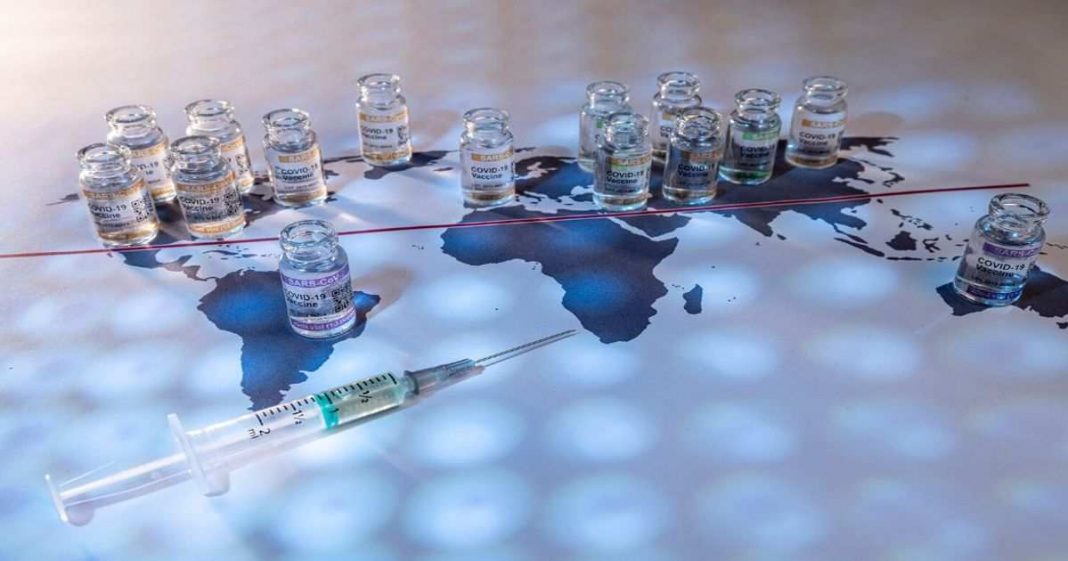“But while hundreds of millions of vaccine doses have been administered globally, there are deep disparities. In high-income countries, vaccine supplies are sufficient to provide for around one in four people, on average; in low-income countries, this figure drops to one in 500. At this point, it should go without saying that no one will be safe until we have made these cutting-edge technologies available to everyone. The longer we delay, the greater the risk that dangerous new variants will emerge.” – What it will take to overcome the pandemic’ by Palitha Abeykoon, Maha El Rabat, and David Nabarro, and published recently in Project Syndicate (PS)
As per ‘Airfinity’, a company that produces data on life sciences, there were already around 2.8 billion vaccine doses produced globally. Moreover, according to a recently released report titled Covid-19: make it the last pandemic, and produced by the Independent Panel for Pandemic Preparedness and Response there are around 5.7 people of age 16 and over.
Hence, if there were no vaccine hoarding by rich countries, the number of vaccines produced would already have been enough to vaccinate (on two doses-per-person basis) the entire global population of age 16 and over.
Read more: Covid-19 vaccine – a commodity for the rich of the world
However, the world is witnessing a huge vaccine inequality where the rich countries have a lot more vaccines at their disposal than needed for their adult population, while the poor countries, mainly in the global south, are acutely struggling.
For instance, Canada and the USA had 6.5 and 3 times more vaccines than needed (on two doses-per-person basis), while on the other hand, countries in Eastern Europe had 1.8 doses per adult, and Pakistan had only 1 dose per adult for 2021.
Read more: Looking for vaccines: what is Pakistan doing wrong?
As per this estimation, even if Pakistan fully administered its vaccine supply, which is very unlikely given the health sector capacity constraints of a developing country, it will be able to vaccine its entire adult population by end of 2022. This is indeed very slow, and the longer a country takes to vaccine, the greater are the chances of new potent mutating variants appearing.
The greed and cruelty of the rich nations
Given the acute nature of global vaccine inequality between rich and poor countries, the vaccination rates also point towards a huge gap. Countries like Canada and the USA have already provided around 59 percent and 64 percent respectively of their adult population with one dose of vaccine.
However, developing countries like Pakistan have administered only around 3 percent of their adult population with one dose, and only one percent of adults fully vaccinated on a two doses-per-person basis. In Africa, only two percent of the adult population has been inoculated.
Read more: Rich nations profiting from Covid: Where are their morals?
This indeed puts the rich countries in danger of a future mutated Covid variant towards which their inoculated population may not be covered.
Moreover, African Centre for Disease Control and Prevention (Africa CDC) indicated that up till May 20, “Coronavirus variants of concern have been found in 37 African countries.” So, from that perspective of possibly new dangerous mutating variants emerging, the rich, advanced countries need to transfer the hoarded vaccines to poor developing countries and also put their weight at World Trade Organization (WTO) for enabling waiver of intellectual property rights (IPRs) on Covid vaccines, at least during the tenure of the pandemic.
Read more: Mumbai in lockdown as Indian vaccines run short
The thing of course is that rich countries have hoarded a lot more than their requirements, while poor countries have very little supply of vaccines. Production is also low because pharmaceutical companies are sticking to IPRs for safeguarding ever-higher profits, while factories in many parts of the world have the capacity to produce but are forced to sit idle.
What cruelty, as people suffer and in certain cases even die, profits and vaccine nationalism continue to remain the paramount concern worth selfishly guarding.
Read more: Corona pandemic is a gift of neoliberal economics?
Looming fears for developing countries
The slow vaccination rate in Pakistan is due to the above reasons. Having said that, most of whatever supply remained, was not captured by Pakistan. The government also failed by reportedly not actively pre-ordering the vaccines on time.
Moreover, it was difficult to reserve orders for this year since most of the production for this year has already been booked. Therefore, most of the vaccines received will either be as a gift or under the COVAX facility, which has also been slow with its supply and a lot less than previously indicated, mainly due to lack of supply from India, given its own Covid crisis.
Read more: COVID-19 cannot stop taking lives of Indians
In the same report by the independent panel, issues facing with regard to COVAX were indicated as ‘The COVID-19 Vaccines Global Access Facility (COVAX Facility), rapidly established with the intention of ensuring global, equitable access, is making good progress but has been hampered in that goal by a lack of sufficient funds and by vaccine nationalism, and now, vaccine diplomacy.’
Vaccine inequality, and the resulting stark difference between vaccination rates, has also led to ‘great divergence’ as pointed out by International Monetary Fund (IMF) between rich, advanced countries and poor developing countries.
Read more: COVID-19 vaccine is a ray of hope but is it a ray of hope for all?
This will produce greater difficulties for the global economy, especially highlighting concerns for a ‘debt pandemic’, as more and more already indebted developing countries may crumble under additional undertakings to provide a stimulus for undoing the impact of a pandemic-related recessionary environment that the world passed through for many months. However, given the fears of many more waves, such pressures may return in one intensity or another.
The writer holds Ph.D. in Economics degree from the University of Barcelona and previously worked at International Monetary Fund. He tweets @omerjaved7. The views expressed in the article are the author’s own and do not necessarily reflect the editorial policy of Global Village Space.














